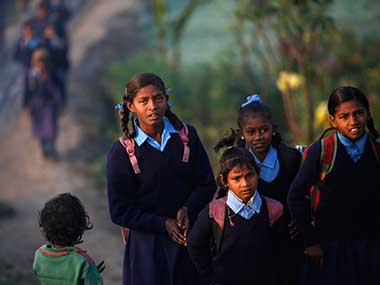By Swagata Yadavar If a girl in India studies for 12 years or more — till the age of 18 — she is less likely to have teenage pregnancy, less likely to have shorter interval between children and less likely to have more than two children during her lifetime, according to the latest national health data. [caption id=“attachment_4314439” align=“alignleft” width=“380”]
 Representational image. Reuters[/caption] A woman with 12 years or more of education has her first child at the median age of 24.7, which is 3.7 years more than the median age of first pregnancy (21) for women between 25-49 years, according to the National Family Health Survey, 2015-16 (NFHS-4)
report. A woman with no schooling has her first child at 20. Almost one-third or 33.6 percent of India’s population is born of adolescent pregnancies; delaying the onset of childbearing could reduce India’s projected 2050 population of 1.7 billion by more than a quarter, IndiaSpend
reported on 12 January, 2018. If a woman studies for 12 years or more, she has an average of 2.01 children, compared to 2.2 for all women and 3.82 for women with no education, based on the mean number of children born to women aged 45-49–a period that marks the end of a woman’s fertility. “Postponing first births and extending the interval between births have played a role in reducing fertility in many countries,” said the NFHS-4 report. The total fertility rate for women — the number of children she will have in a lifetime — between 15-49 years is even lower at 1.71 for women with more than 12 years of education compared with 3.06 to women with no education and 2.2 for all women. “Education is the best contraceptive pill,” said Poonam Muttreja, executive director, Population Foundation of India, an advocacy working on family planning. There is enough global evidence showing that educating women can reduce the fertility rate of countries, Muttreja said. “Now, national evidence also points that educating women can be a good population control strategy.”
Only 4 percent of women with 12 years or more of education have teenage pregnancies compared with 8 percent for all women and 20 percent for women with no schooling. Child bearing at a very young age is associated with increased risk of complications during pregnancy and childbirth and higher rates of neonatal mortality. Children born to educated mothers have higher chances of survival; under five mortality — deaths per 1,000 live births of children under five — of children whose mothers had no schooling was 67.5 while it was less than half (26.5) for children of mothers who had more than 12 years of schooling, IndiaSpend
reported on 16 January, 2018.
“Education is the best contraceptive pill,” said Poonam Muttreja, executive director, Population Foundation of India, an advocacy working on family planning
Advertisement
End of Article


)

)
)
)
)
)
)
)
)



